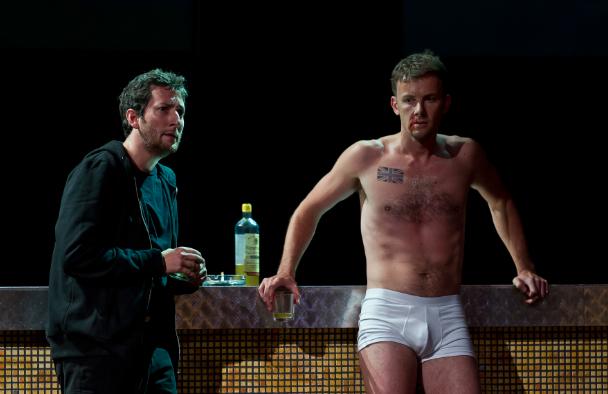There's no guaranteed route to success with contemporary opera but, ever since Nixon in China, topicality and realism have become the most favoured and trusted paths to some kind of favourable outcome. Two chamber operas, receiving their English premiere at the Linbury Studio Theatre on the weekend, joined this ever-expanding modern school of verismo.
Huw Watkins, who moonlights as one of the finest young pianists of his generation, delivered the first, In the Locked Room. This 50-minute work, scored in a very reserved, very English way, offers us a simple domestic melodrama shot through with some fashionable themes of the day. Ruby Hughes's Ella is trapped in a loveless marriage to banker Paul Curievici's Stephen. Their dream move to the coast puts her into contact with poet Pascoe (Hakan Vramsmo), whom Ella falls for and has an affair with. She is faced with a dilemma. Does she go for the soulful artist or the soulless money bags? It's a question that librettist David Harsent no doubt wants us to ask of our society too.
The productions were unfussy and uninspiring
As plotlines go, it's hard to think of an older or more hoary one than this tale of poet vs parvenu. It's also difficult to imagine it being delivered more predictably. Throughout the episodic libretto, ingratiating music and tasteful goings on on set, cliché is stuck to doggedly. The banker it turns out is a bit of a Julian Assange. The poet's troubled - and ends up killing himself. The trapped wife has an interior life and creative yearning that she wants an outlet for. The interior locked room is doubled by a real locked room, the metaphorical broken home echoed by a real house that splits in two etc.
Every idea was obvious. Every opinion was received. Every line toed a boring, troglodytic orthodoxy. Banker: bad. Poet: good. Woman: oppressed. In this year where all the running has been made for the argument that art can make you better and wiser, my first thought was that here was art that definitely made you more dumb. My second thought - give me a successful banker over an unsuccessful poet any day - perhaps proved the first.
Next to Watkins's forgettable score, MacRae's ballsy offering in Ghost Patrol was a godsend. Muscular, energetic, inventive and smart, the percussive and spasmodic sounds were always there to catch Louise Welsh's libretto when it began to totter. Welsh's story begins convincingly enough, in the middle of a raid on a bar. Barman Alasdair collars burglar Sam before realising they both served in the army together. He gives the destitute former comrade a job and inadvertently also access to his wife. As an affair ensues and trouble returns, Welsh foolishly abandons detail and realism for profundity and message. A nicely told love triangle with plenty of potential goes up in a puff of po-facedness.
That the evening is not entirely squandered is down to a fantastically committed performance from James McOran-Campbell as the barman Alasdair (the only three-dimensional character) and MacRae's intelligent word painting and engrossing colours. Conductor Michael Rafferty and the orchestra of Music Theatre Wales deserve much credit for bringing these musical qualities out. The productions meanwhile (Michael McCarthy for In the Locked Room; Matthew Richardson for Ghost Patrol) were unfussy and uninspiring.















Add comment